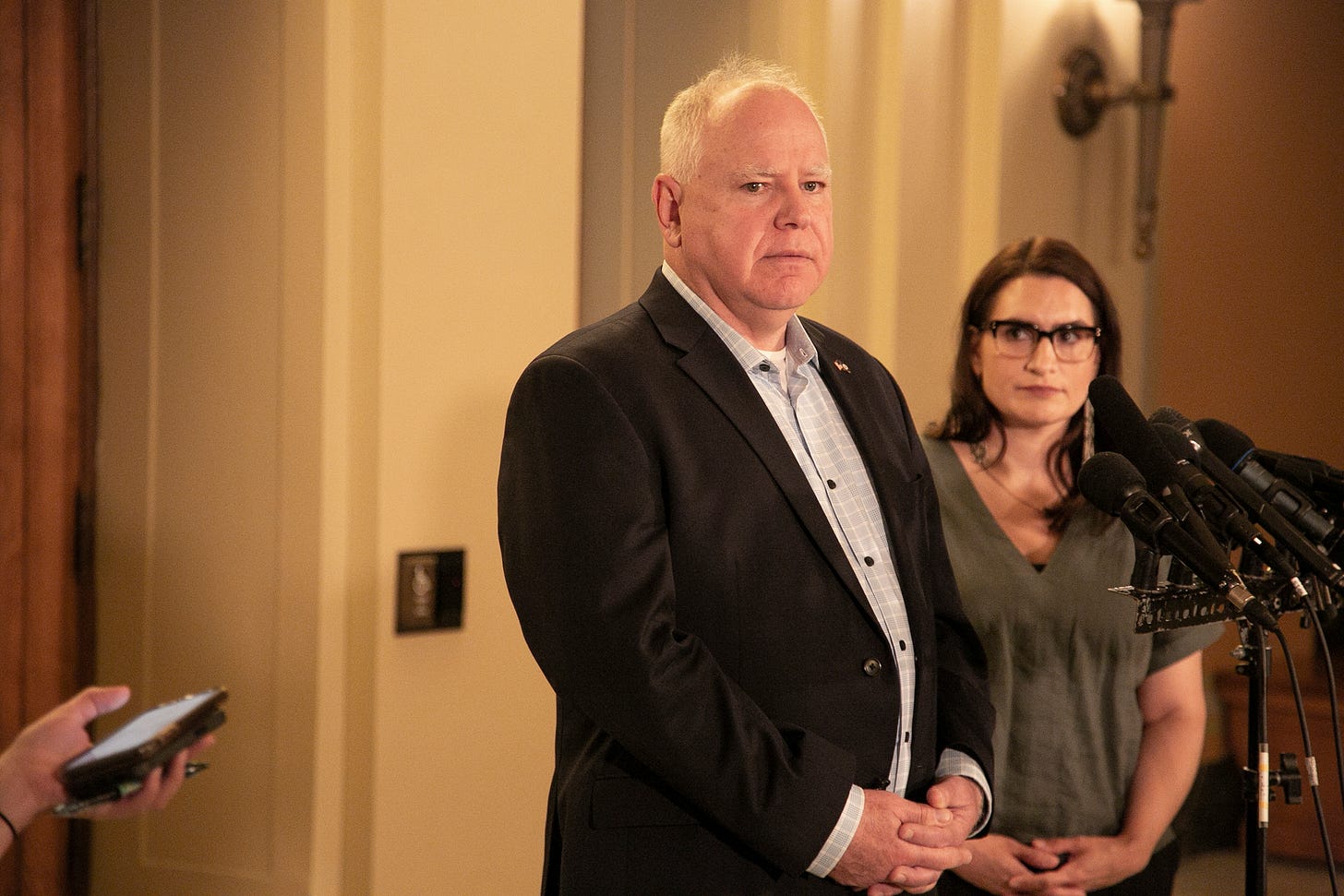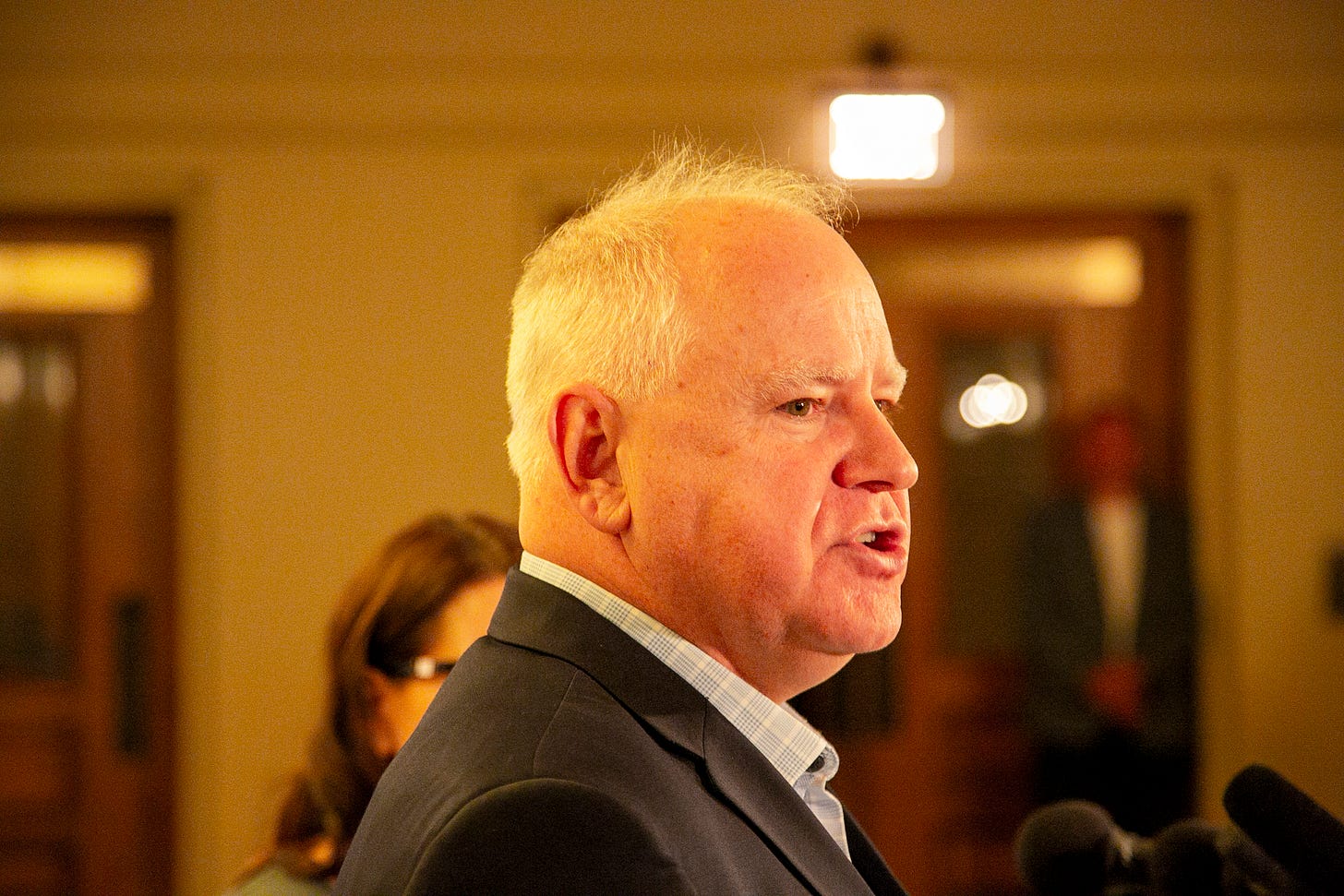Walz: Public safety negotiations 'stuck'
But governor says he expects breakthrough sometime in next 24 to 48 hours
The public safety/judiciary budget and policy bill, as the state’s chief executive put it Thursday, will be “the last plane to land.”
“It’s probably fair to say it's a little bit stuck,” Gov. Tim Walz said of the negotiations, which have gotten hung up on police reform. “Folks are really passionate about this.”
Walz spoke to reporters at the Capitol late Thursday afternoon, offering a 16-minute update on the status of budget negotiations.
Most are going swimmingly. Twelve of the 13 budget agreements needed to keep government functioning are either well on their way to completion or already headed to the governor’s desk for signing.
The House, for instance, on Thursday passed the housing omnibus bill that includes the eviction moratorium off-ramp. It now heads to the House.
The Senate, meanwhile, passed a transportation package that includes $7.8 billion for state roads on Thursday. It had already cleared the House and now heads to the governor’s desk.
There also are agreements on several problem areas—E-12, health and human services and state government operations—that had been viewed as potential sticking points.
“You see them becoming unstuck now,” Walz said. “We finally got education. We're not going to have voter ID. Those were things that were holding things up.”
But there remains a single, major bottleneck: Deadlocked negotiations over the bill that funds and governs the state’s judiciary, law enforcement and corrections system.
“I think it's just that stalemate piece of it,” Walz said, “and a tough climb.”
A day or two
The governor, who met with the media at 4:30 p.m., Thursday, said he thinks a deal is “probably inevitable.” He said he expects it would take another 24 to 48 hours before a final public safety agreement is in place.
However, during the press conference, TPT’s Capitol correspondent Mary Lahammer told the governor that Speaker Melissa Hortman, DFL-Brooklyn Park, has warned that people should “stay tuned all the way to June 30.” Walz responded with a sigh.
“I hope not,” he said. “I don’t know why”
Walz said he doubts putting things off to the last minute would shake loose any new deals not already in place. “People at some point are going to realize that [June 30] is a real date,” he said. “It really needs to get done. We really need to move things forward.”
If final agreements are not secured by then, any budget area not funded presumably would go into shutdown. And because of the 2017 Supreme Court decision in 90th Minnesota State Senate v. Dayton, courts are unlikely to repeat past history by providing emergency appropriations to those portions of government that the legislature fails to fund.
Department of Corrections Commissioner Paul Schnell told Session/Law this week that, were that to happen to the public safety division, his department would have enough money on reserve to keep prisons open “a week, maybe two.”
What’s under consideration
Walz confirmed that five policing measures, which Senate Judiciary Chair Warren Limmer, R-Maple Grove, said last week were acceptable to Republicans, are on the table. He even seemed to suggest they’ve been all been agreed to.
It’s not clear that’s the case. House Public Safety Chair Carlos Mariani, DFL-St. Paul, said on June 17 that only three of the GOP offers were acceptable. One of those, he said, was not even a real police-reform measure, but a corrections initiative.
Neither Mariani nor Limmer could not be reached Thursday to confirm whether there has been movement on those issues since last week. But given the intensity of negotiations, their lack of availability isn’t a surprise.
You can read in detail about Limmer’s offers, and Mariani’s responses to them, here. But here a quick summary of the GOP Senate offers to the DFL House:
A policy banning cops from associating with white supremacists or, in the GOP’s parlance, “extremist organizations.”
A model police conduct policy that protects First Amendment rights of protesters.
Travis’ Law, a measure requiring dispatchers to refer mental-health crisis teams to certain emergency calls, not just police.
Matthew’s Law, a measure to protect drug-addicted confidential informants.
The Hardel Sherrell Act, an initiative aimed at strengthening health care delivery to jail inmates suffering medical crises.
While it could not be confirmed that DFL negotiators have moved toward the GOP on those measures, the governor gave them his personal thumbs up Thursday.
“I think the things that you mentioned there are bipartisan,” he said. “They make sense. They're supported by both activists and law enforcement and we really believe those things make a difference.”
Walz said that a sixth item, body cams for conservation officers, was something he personally requested be put into the bill. Senate Majority Leader Paul Gazelka, R-East Gull Lake, has characterized that as another area of agreement, though it was not listed by Limmer.
The governor said DFL leaders and the House conferees working on the bill—behind closed doors, it should be emphasized—are trying hard to add at least few more police reforms to the final legislation.
Specifically, Walz said, he hopes to see new no-knock warrant limits imposed and a measure to—as the governor described it—curb the kinds of police stops that led to the deaths of Daunte Wright and George Floyd.
He said that the Republicans’ main public safety priority—protecting the public from a violent crime wave—also must be taken seriously. But rather than emphasizing a need to beef up police presence as Republicans have done, Walz put the onus on information sharing, disrupting gun traffic and community collaboration to help stop youth involvement in street gangs.

Reality check
But a hard reality, Walz said, is that Republicans do not feel the same urgency for police reform as DFLers, particularly members of People of Color and Indigenous Caucus who have pushed most strenuously for police accountability.
“I’m not quite certain how you explain this to people,” Walz said. “When you're trying to negotiate with someone and they are in a position where they don't need anything—they don't want anything and they don't want to change—it’s very difficult to try and move them along. But that's what's been happening.”
In the end, Walz said, legislators must sacrifice some of their biggest priorities to get a public safety/judiciary budget passed on time. He said he thinks that idea is sinking in.
“I think, when folks are in those rooms,” he said, “they're starting to realize that you're not going to get everything moved.”
Still, the governor looked askance at some compromise ideas that have been floated to prevent a total public safety shutdown.
One is a “lights on” continuing resolution bill for public safety/judiciary alone, presumably to fund the division at base level—with no new appropriations—if a new budget isn’t passed on time. Another is a straight-up budget bill with no revamped policing policies.
“I don't think that's a healthy attitude on it,” he said. “I think they know what needs to be done. I think we know now what folks are going to give on and what they're not. And at this point in time, we need to be respectful to what we can get done.”



